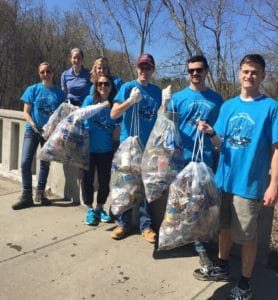
Corporate philanthropy has changed dramatically over the past decade. First and foremost, millennials have entered the workforce in droves, and they play a major part in company influence. While Generation X and Baby Boomers tend to make a clear delineation between work and life, millennials maintain fluidity in all aspects of their lives and expect far more out of their employers. Therefore, employee engagement has become paramount to the success of today’s companies, and one of the best ways to foster employee engagement is through a culture of philanthropy.
Building a culture of philanthropy requires a concerted effort from senior management and human resources. Gone are the days of holding an annual food drive at Thanksgiving or toy drive during the holiday season. Today, year-round involvement in charitable ventures and the community is almost expected, through both volunteerism and financial commitment. National Philanthropy Day, which falls on November 15, is an exemplary time for corporations to truly examine their philanthropic culture – or lack thereof.
Where to Start?
Creating an authentic culture of philanthropy requires three key ingredients. First and foremost, leadership involvement is essential. Employees, particularly millennials, know when an employer is fully committed and when they are just going through the motions. A true culture of philanthropy requires both buy-in and participation from leadership.
Second, workplace giving programs and volunteerism should be an integral part of a company’s corporate identity – which again comes down to support from leadership. Because culture always trickles down from the top, involvement from leadership is an absolute requirement. While a company can say that giving of money and time are important, senior management’s actual participation in a company’s charitable ventures provides authenticity through leading by example. Without leadership involvement, employee engagement programs will appear superficial and perfunctory and are likely to fail.

Third, charitable programs must align with both employee interests and corporate goals. For example, Gardener’s Supply Company in Vermont is a retail and online gardening supply company that offers everything from seedstarting supplies and garden furniture to flower supports and garden carts. Like Tata & Howard, they are also 100% employee-owned. In 2013, a group of employees at the Burlington location started Company Farm. Their goal was to grow potatoes to donate to people in need. In the first year alone, employee-farmers grew over 300 pounds of potatoes on a set of thirty 4×6-foot raised beds just off the company’s main parking lot. All of these potatoes were donated to support need in the local community, and Gardener’s Supply plans to increase their output as well as encourage other companies to also turn some of their lawns into farms.
How to Get Involved
A culture of philanthropy is not just for large companies – small-to-mid-size companies are becoming increasingly involved as more and more millennials enter the workforce. While larger companies are able to support a variety of charitable ventures, smaller companies need to be more strategic in their philanthropy. Several ways in which companies of all sizes are fostering an engaged workforce include providing paid time off specifically for volunteerism, 100% company matches on all employee donations to 501(c)3 organizations, and company-sponsored charitable events and initiatives that align with the company’s mission, vision, and values. At the core of a true culture of philanthropy is the encouragement and participation at all levels within an organization to give their time, money, and talent.

At Tata & Howard, we are passionate about clean water, so we have forged a partnership with Water For People, a non-profit whose mission is to promote the development of high quality drinking water and sanitation services, accessible to all, and sustained by strong communities, businesses, and governments. Water For People is our charity of choice, and employee-owners are able to donate directly to the organization through payroll deductions, which the company matches 100%. In addition, Tata & Howard employee-owners participate in other charitable events that complement our corporate philosophy, including river clean-ups, cancer research fundraising, food drives, and the Navajo Water Project, to name a few. Supporting charitable organizations and events that have a direct tie to a company and to its employees is key to true employee engagement.
Looking Ahead
Because of the changing face of our workforce, building a culture of philanthropy is no longer considered either incidental or superfluous. In fact, the most engaged companies have substantial and clear policies in place that support philanthropic ventures at all levels within their organizations. And the payoff is clear: reduced attrition, greater productivity, higher profits, and also a positive team environment that makes the world a kinder, gentler place.
Care to share? We’d love to hear how your company celebrates National Philanthropy Day and promotes a culture of philanthropy!
